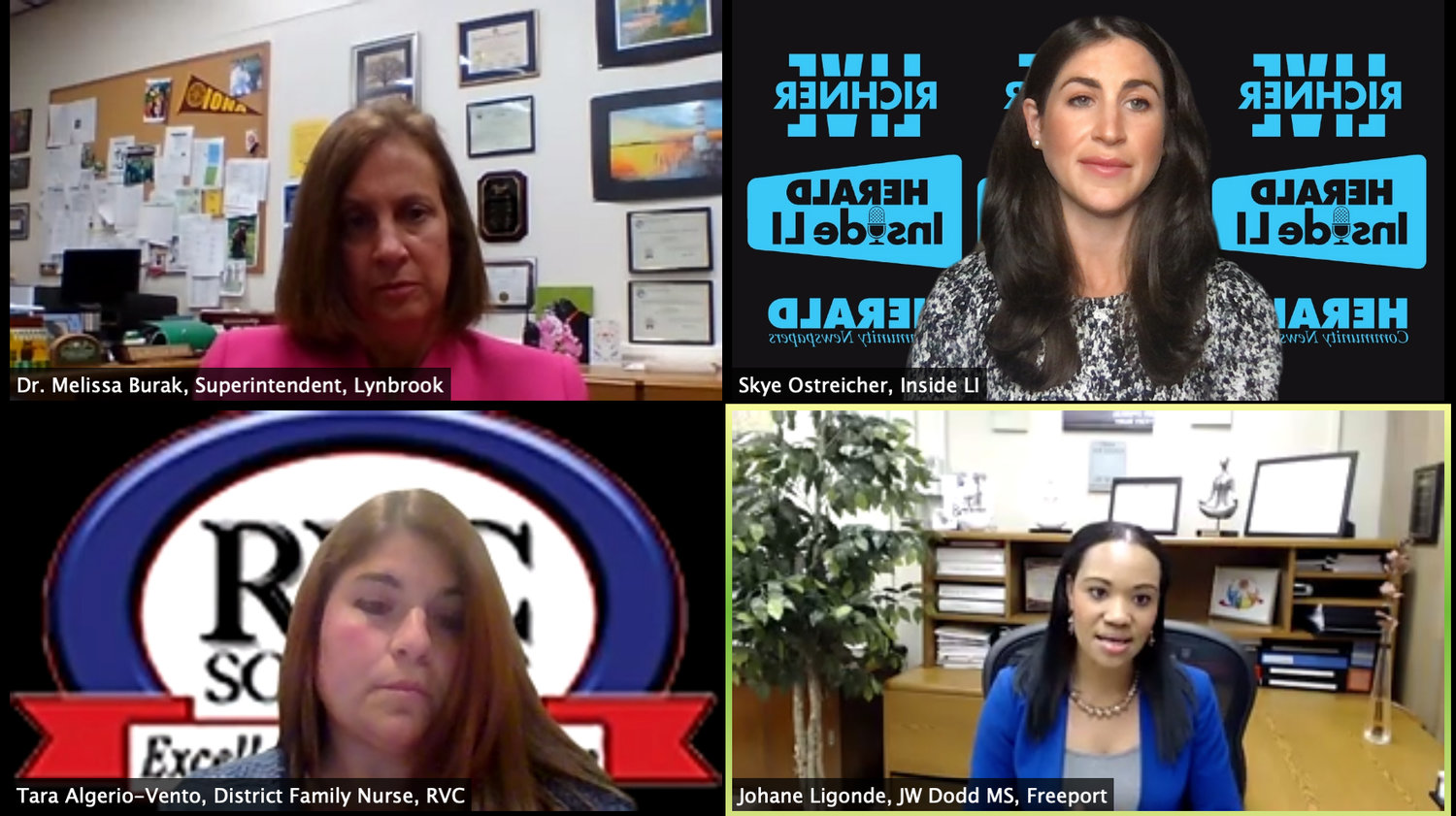Inside LI panel looks at hybrid learning
Educational leaders on the latest Herald Inside LI webinar agreed that reopening schools amid the coronavirus pandemic has been challenging, and the learning curve for students and teachers is ongoing.
Three panelists — Johane Ligonde, principal of J.W. Dodd Middle School in Freeport; Dr. Melissa Burak, superintendent of Lynbrook Public Schools; and Tara Algerio-Vento, family nurse practitioner in the Rockville Centre School District — discussed how the first two weeks of back-to-school have gone during the virtual conversation produced by RichnerLive on Sept. 17.
Molloy College presented the webinar, and Dr. Audra Cerruto, associate dean and director of graduate education programs at Molloy College’s School of Education and Human Services, gave opening remarks. She said Molloy’s programs for future teachers are adapting to “address the academic challenges of Covid-19, particularly in the areas of curriculum development, implementing innovative and effective methods of instruction, social emotional learning, social justice and technology development.” She added that Molloy has professional development programs at low rates to help current teachers adapt, as well.
Moderator Skye Ostreicher, of RichnerLive and Herald Community Newspapers, fielded viewers’ questions about the myriad challenges that teachers, parents and students face this year.
“Our students are following the protocols, our families are following the protocols,” Ligonde said. “They’re very aware of the seriousness of it, and more importantly, they’re happy to be back in school.”
Burak agreed, noting that she could see kindergarteners' eyes light up as they smiled behind their masks, happy to be in the classroom with their peers.
On the other hand, returning to school has caused stress for many, Algerio-Vento noted. Some students felt anticipatory anxiety because of the many changes, and other younger students may be feeling separation anxiety after spending so much time with their families and suddenly attending school nearly every day.
“We are screening our children to make sure they are mentally well,” she said. “Social workers are pushing into the classrooms, parents are taking surveys, students are taking surveys, just so we can get a grasp of where they are.”
In terms of in-person protocols, most districts look the same: requiring social distancing and facemasks and limiting visitors and movement within the building. All districts also have a form of hybrid or blended learning, for which some students are learning in the classroom on certain days and others are studying remotely. These schedules and procedures are different depending on space in the buildings and the number of students who request fully remote learning.
After determining those schedules, the challenge has been adapting to the new technologies, the educational leaders agreed.
“The teachers are learning, the students are learning,” Burak said. “We have put a tremendous amount of pressure on our teachers to learn the technology that’s needed to teach the students in front of them, as well as the students at home, simultaneously, all live.”
Technology can also pose a challenge because not all students are working with the same devices at home, and they may not have the same internet speed as they do in the classroom. To remedy this, Ligonde said the Freeport district has provided students with WiFi hotspots.
At the same time, Ligonde noted that the new ways of teaching have allowed some students to rise to the occasion. “It’s about maximizing the technology we have at our disposal,” she said, “and making ourselves available for one-on-one support.
“Believe it or not,” she continued, “our students are texting our teachers, emailing our teachers and asking more questions than they’ve ever asked before because they understand the responsibility … of learning really lies on them.”
One viewer asked the panelists how students would be disciplined during virtual instruction. Across the board, the panelists agreed that codes of conduct have been revised to include online learning. Ligonde noted that discipline is about bringing awareness to behaviors, educating and communicating with students and families.
Another viewer asked how students would be assessed this year, given the unusual modes of instruction. All agreed that there would need to be flexibility in grading students. They also advocated for the State Education Department to cancel standardized testing in 2021, as it did this year. “One test does not define the student,” Algerio-Vento said.
“In terms of how we measure student success, we will be upholding similar expectations and standards,” Ligonde added, “but there has to be some flexibility, and that’s something that we’re negotiating together.”
The next Herald Inside LI webinar will focus on the delay of high school and college sports. To register, visit liherald.com/insideli.

 39.0°,
Fair
39.0°,
Fair 




